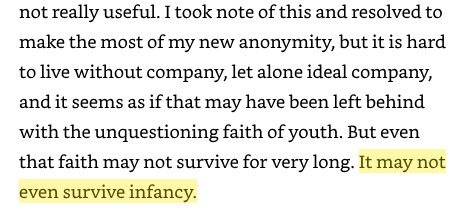Text

Anne Sexton, from a letter to Dr. Martin Orne, featured in “Anne Sexton: A Biography,” by Diane Wood Middlebrook
388 notes
·
View notes
Text
“So we went into the churchyard to have a look at the graves. The church itself was tiny, crooked, Norman, with a pretty, rosy, lichen-crusted roof of tiles. Beside it grew a yew tree, said to be a thousand years old. Its trunk was of gigantic girth, belted with a chain to hold it together, twisted and moulded into vast bosses, knots, inlays and depressions, into sculptured reliefs of frenetic inspiration and irresponsibility. Silvery, veined with iron black, its substance, seen from close, gave a mineral impression: it had nothing of the warmth and life of wood. From father off, this stoniness dissolved, became fluid, tender; became a column of water, pale and dark, pouring down silently out of the core of the sombre spread of branches.”
(This passage comes from a novel called ~ The Ballad and the Source ~ which was written by Rosamond Lehmann.)
1 note
·
View note
Text
“She had pretty ways, old-fashioned ways, and became the pet of the kitchen, where she made little jam tarts and showed off and prattled about herself in the third person to her heart’s content.”
(Rosamond Lehmann)
2 notes
·
View notes
Text
“I was so romantic and idealistic about you—you’ve no idea.”
— Rosamond Lehmann, Dusty Answer (1927)
3K notes
·
View notes
Text



At the Hairdresser's by Anita Brookner
3 notes
·
View notes
Text
My family was a source of many frustrations, which was why I invested so heavily in friendship.
At the Hair Dresser's by Anita Brookner
3 notes
·
View notes
Text
What would a husband have looked like a way in to? Not life. She didn’t want that. Perhaps some private billet in life. A place she could feel was her rightful place, from where she could look out at other people less fearfully. That doesn’t sound so outlandish, does it? The trouble is, I think being let in to that place was meant to be it. To be recognized, welcomed, delivered . . . This was the model of so many of the situations my mother contrived for herself and then extolled. Her social whirl. Her house moves. Her holidays, later. But they never were ‘it’. The inclusion would turn to exclusion, every time.
My Phantoms by Gwendoline Riley
0 notes
Text
“We’re so busy resigning ourselves to the inevitable, that we don’t even ask if it is inevitable. We spend so much time accommodating ourselves to other people’s standards, we don’t even ask if our own might not be better. We’re so much occupied in letting live that we haven’t even begun to learn yet how to live.”
- South Riding by Winifred Holtby
9 notes
·
View notes
Text
Hate hate hate. But my mother didn’t hate. It was just a word she used. It was just her announcing-ness. She thought it sounded vital and dashing. She thought it set her apart.
My Phantoms by Gwendoline Riley
0 notes
Text

Crescent Moon. 5:49 pm. 47 F°. Darien, CT (@dkct25)
55 notes
·
View notes
Text
“6/18/44. Note here: Happy days lead to stagnation of the mind. Happy days even in my opinion, reading, writing, drawing. Nothing has come in the way of ideas in the last two happy days. I used to think such days produced ideas. Now I wonder if frequent disturbance isn’t necessary.”
— Patricia Highsmith, “Patricia Highsmith: Her Diaries and Notebooks: 1941-1995.″ Anna von Planta (Editor). (Liveright, November 16, 2021)
17 notes
·
View notes
Text
“August 15, 1941. Very, very happy and full of thwarted ambition—I want to sit down at a typewriter in a room all alone. I want long days to mull over what I’ve seen, silent hours to dream out stories that are as delicate, in the first plot germs, as smoke rings.“”
— Patricia Highsmith, “Patricia Highsmith: Her Diaries and Notebooks: 1941-1995.″ Anna von Planta (Editor). (Liveright, November 16, 2021)
9 notes
·
View notes
Text
Man without a god is worth nothing at all.
2/27/44. Man without a god is worth nothing at all. The god may be a woman, an inspiration, an ambition, a fetish, an indulgence tempered with ceremony and self-denial, but unless he lives by something which he serves as being greater, consciously, or unconsciously to him, than himself, he is less noble than his own dog.
— Patricia Highsmith, “Patricia Highsmith: Her Diaries and Notebooks: 1941-1995.″ Anna von Planta (Editor). (Liveright, November 16, 2021)
12 notes
·
View notes
Text
“3/ 1/ 66. The essence of life is to welcome a challenge, even though not being quite sure how to meet it.”
— Patricia Highsmith, “Patricia Highsmith: Her Diaries and Notebooks: 1941-1995.″ Anna von Planta (Editor). (Liveright, November 16, 2021)
105 notes
·
View notes
Text
I make all my decisions on intuition, but then, I must know why I made that decision. I throw a spear into the darkness. That is intuition. Then I must send an army into the darkness to find the spear. That is intellect.
Ingmar Bergman
234 notes
·
View notes
Text
Anne Sexton sometimes seemed like a woman without skin. She felt everything so intensely, had so little capacity to filter out pain that everyday events often seemed unbearable to her. Paradoxically it is also that skinlessness which makes a poet. One must have the gift of language, of course, but even a great gift is useless without the other curse: the eyes that see so sharply they often want to close.
Erica Jong, from ‘Remembering Anne Sexton’
515 notes
·
View notes
Text
The music lived, but the world was dead. And the song would die one day, she thought, but how would the world come back to life? How would its salt come back?
Patricia Highsmith, ‘Carol’
34 notes
·
View notes